|
|
|
Sort Order |
|
|
|
Items / Page
|
|
|
|
|
|
|
| Srl | Item |
| 1 |
ID:
161127
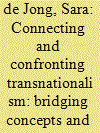

|
|
|
|
|
| Summary/Abstract |
This article traces the trajectory of transnationalism as a perspective and field of study and suggests that new impetus can be given to its development by establishing a dialogue between transnationalism and other key concepts. While the research agenda of the early stages was characterised by a need to distinguish transnationalism from related terms, such as globalisation, we argue that the field could now regain momentum by exploring synergies with other concepts. In this special issue we stage confrontations between transnationalism and, respectively, the (perspectives opened up by the) concepts of ‘borders’, ‘translocality’, ‘precarity’, ‘queer’, ‘moralities’, ‘the state’, and ‘brokerage’. Conceptually, this allows us to go beyond an internal critique that exposes the shortcomings of a transnational perspective, by suggesting novel frameworks and toolkits. Substantively, this issue’s articles demonstrate the need to refocus transnational studies’ attention to the unevenness, instability and inequality of transnational space.
|
|
|
|
|
|
|
|
|
|
|
|
|
|
|
|
| 2 |
ID:
126043


|
|
|
|
|
| Publication |
2013.
|
| Summary/Abstract |
Throughout Central Asia, the end of communism has been marked by a significant change in the management and influence of local mosques. In many rural areas, small underground mosques operated by informally trained, elderly moldas have been supplanted by newly constructed mosques led by younger, foreign-educated local imams and financed by governmental and private donations from Turkey, Saudi Arabia, and other countries. From several perspectives, this 'revival' of Islam is characterized in a way that implies that increased religiosity and piety is somewhat problematic. In this essay, based on six months of ethnographic fieldwork in Western Mongolia, we argue that such an approach prevents an understanding of how religious changes are enhancing the social and material well-being of certain actors. We explore the utility of the concept of well-being by focusing on the everyday lives of Kazakh imams in Western Mongolia. Approximately 100,000 ethnic Kazakhs live in the Western Mongolian province of Bayan-Ölgii, where they comprise about 80% of the population. Although a significant portion of the population has been migrating to Kazakhstan in the post-socialist period, the Kazakhs who choose to remain in Mongolia have experienced a significant increase in religious freedom. In this context, the new cohort of imams is playing an important mediating role as members of the local population reinterpret and renegotiate their identity as Muslims. In addition to finding spiritual well-being through their knowledge of Islam, these imams are acquiring social status and economic security from their local roles as religious leaders and through their transnational connections with a broader Muslim community.
|
|
|
|
|
|
|
|
|
|
|
|
|
|
|
|
| 3 |
ID:
087482
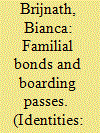

|
|
|
|
|
| Publication |
2009.
|
| Summary/Abstract |
In January 2007 a first generation Indian migrant with Australian citizenship travelled to the United States from Australia to provide care for her Indian grandmother with severe dementia. She did so because her grandmother's primary carer, the Indian migrant's maternal aunt, had to escort her Filipina maid of over ten years back to the Philippines, after the maid had suffered an aneurism and had recovered enough to express her desire to return home. The multiple narratives embedded in these few lines illustrate that in the daily lives of transnational families and caregivers, gender, generation, migration, access, and homeland come together in a myriad of ways that complicate understandings of traditional caregiving and raise the question: whose 'story' do we focus on? Using an expanded framework of global care chains as articulated by Nicola Yeates and Loretta Baldassar's work on caregiving in transnational families, I explore through this personal 'case-study' how each link within the chain maps to the other and the power dynamics that contextualise these links. Building on Yeates' work, I argue for the recognition of temporality in transnational caregiving and conclude with a call for further research and theorising on caregiving that takes account of the transformations and transactions that occur within families in a global context.
|
|
|
|
|
|
|
|
|
|
|
|
|
|
|
|
| 4 |
ID:
123923
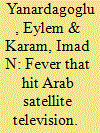

|
|
|
|
|
| Publication |
2013.
|
| Summary/Abstract |
Turkish television drama series were locally produced products until the early 2000s. Since then, about 70 different titles have been broadcast to audiences in 40 countries, especially in the Middle East, where they comprise approximately 60% of the share in foreign programme broadcasts. This article explores the factors that led to such an attraction by considering the debates around the impact of transnational media products on Arab cultural identity. The authors conducted focus groups and interviews with audiences in Palestine and Egypt and with the producers/distributors of these TV series in Turkey. The data presented here comprise the results of one of the first field-based studies on the reception of Turkish media products in the region. Foremost, the Arab audience response to these Turkish TV series highlights the differences in conceptualisations of 'modernity' in the Arab World. Moreover, the data suggest that audiences do not necessarily consider transnational media products as culprits that corrupt cultural identity.
|
|
|
|
|
|
|
|
|
|
|
|
|
|
|
|
| 5 |
ID:
192981
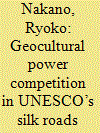

|
|
|
|
|
| Summary/Abstract |
Since Chinese President Xi Jinping announced the Belt and Road Initiative in 2013, China has increasingly engaged in UNESCO’s Silk Roads project. China’s emphasis on its western routes signals its strategic interest in the reconstruction of its historical connections that matches China’s global networking in Eurasia, the Middle East, and Europe. However, whether China will successfully reformulate the international visions of the past, present, and future for its benefit remains an open question. This article focuses on the responses from Japan and South Korea, both of which hold critical positions as the owners of eastern Silk Roads heritage and the funders of UNESCO’s Silk Roads heritage studies and World Heritage nomination assistance. Extending the conceptual framework of memory infrastructure to the study of heritage politics and diplomacy highlights the competitive aspect of a transnational heritage project in shaping and reshaping historical and contemporary geographical landscapes.
|
|
|
|
|
|
|
|
|
|
|
|
|
|
|
|
| 6 |
ID:
118234
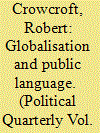

|
|
|
|
|
| Publication |
2012.
|
| Summary/Abstract |
This article questions what the concept of 'globalisation' really amounts to. In doing so it highlights problems for the ascendancy of globalisation in contemporary public debate. Globalisation has become a catch-all; the phrase is now used to try and explain all manner of phenomena from everyday life to international politics. But the article suggests that this may be little more than a combination of rhetoric and wishful thinking. It asserts that the contemporary world is being driven by older and familiar pressures, such as state power and nationalism. As a result, the idea of 'globalisation' needs to be treated with some scepticism.
|
|
|
|
|
|
|
|
|
|
|
|
|
|
|
|
| 7 |
ID:
060629
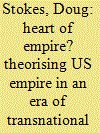

|
|
|
| 8 |
ID:
128574
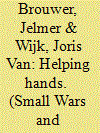

|
|
|
|
|
| Publication |
2013.
|
| Summary/Abstract |
This article analyses to what extent the Burmese KNU insurgency made use of external support from states, refugees, and diasporas. Based on extensive fieldwork it is concluded that support from neighbouring states and refugees has for years kept the Karen rebellion alive. Western countries perceived forms of resistance to the illegitimate Burmese regime as just and have therefore played a crucial role in the continuation of conflict in Karen State. It is important that policymakers and donors as well as executing organizations continue to reflect critically on the way they exercise their work.
|
|
|
|
|
|
|
|
|
|
|
|
|
|
|
|
| 9 |
ID:
190342
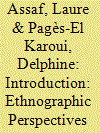

|
|
|
|
|
| Summary/Abstract |
This introduction offers a general framework to this Special Section which aims to unpack the ambivalences of cosmopolitanism in the Gulf region. It argues that cosmopolitanism is a heuristic concept for the critical analysis of extreme urban diversity in non-Western, non-democratic contexts. Indeed, it acts as a tool for exploring the tensions between logics of exclusion –– underlined by policies that maintain foreign residents outside of the citizenry –– and logics of integration, triggered partly by the competition among global cities to attract talents. While this introduction outlines the many theoretical debates surrounding the notion of cosmopolitanism, the five articles adopt an empirically-grounded approach to display new interdisciplinary perspectives on cosmopolitanism in Gulf societies, based on two overarching observations. First, they deconstruct state narratives of cosmopolitanism as a normative political discourse, with its lexicon of tolerance, diversity and coexistence. Second, they advocate for an understanding of cosmopolitanism built upon the study of individual representations, trajectories, and practices rather than as an ideal of coexistence and openness to the other.
|
|
|
|
|
|
|
|
|
|
|
|
|
|
|
|
| 10 |
ID:
145854
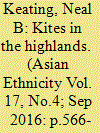

|
|
|
|
|
| Summary/Abstract |
Bunong people from both sides of the Cambodia–Vietnam border are increasingly self-identifying as Indigenous peoples and claiming collective human rights as Indigenous peoples at international platforms, such as the United Nations Permanent Forum on Indigenous Issues. As of now the Bunong from Vietnam articulate Indigeneity from a diasporic distance, having fled the country as political refugees. The aim of this article is to compare and contrast the networks of Bunong Indigeneity that now seek cross-border and transnational connections, and examine the blockages and openings that appear as a result. The border between Vietnam and Cambodia separates Bunong communities and families spatially, politically, and culturally. Cambodia recognizes Indigenous peoples, while Vietnam does not. Through primary research with Bunong activists, combined with secondary sources, this article adopts a comparative cross-border approach to the Bunong articulation of Indigeneity, and asks where this movement may be headed.
|
|
|
|
|
|
|
|
|
|
|
|
|
|
|
|
| 11 |
ID:
137925
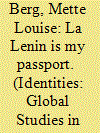

|
|
|
|
|
| Summary/Abstract |
Based on an ethnographic study of transnational networks of alumni of an academically selective boarding school in Havana, this article explores the nexus between mobility, schooling and belonging in the context of socialist Cuba and its diaspora. Drawing on Goffman’s work, I argue that the boarding school experience was transformative; it facilitated or consolidated social mobility for its pupils, which later, for many, led to geographic mobility in the form of study and work outside Cuba. After graduating, alumni continue to identify with the school and to reproduce their alumni identities. The affective webs of belonging forged through family links and friendships fostered at the school constitute emotionally sustaining networks that also provide material support after migrating. I propose that the school represents a site of identification for a globally dispersed non-national diaspora and argue that migration scholars need to embed international migration within people’s lives more broadly.
|
|
|
|
|
|
|
|
|
|
|
|
|
|
|
|
| 12 |
ID:
161132
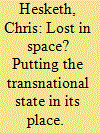

|
|
|
|
|
| Summary/Abstract |
This article explores the notion of a transnational state (TNS) as advanced by scholars working within Historical Materialism. In recent decades, Historical Materialist approaches to the Social Sciences have enjoyed a major intellectual renaissance. Fittingly, the reasons for this renaissance can be found in some major developments within contemporary capitalism. The first of these developments can be located in a renewed interest in the topic of imperialism as an interpretive category of geopolitics. The second development concerns the viability of the capitalist system itself following the global financial crisis of 2007/8. One major attempt to comprehend these issues has come through the postulation of an emergent TNS apparatus as part of a new global capital relation. This article explores this thesis but argues that it fails to adequately account for continued plurality, contingency and struggle at the nation-state scale which in turn provides the basis for potential conflict.
|
|
|
|
|
|
|
|
|
|
|
|
|
|
|
|
| 13 |
ID:
116131
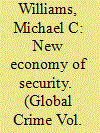

|
|
|
|
|
| Publication |
2012.
|
| Summary/Abstract |
New security dynamics present significant theoretical and empirical challenges. This article suggests that Pierre Bourdieu's ideas about an 'economics of practice' provides a fruitful means for exploring and explaining many of these transformations.
|
|
|
|
|
|
|
|
|
|
|
|
|
|
|
|
| 14 |
ID:
169419
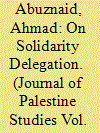

|
|
|
|
|
| Summary/Abstract |
Delegations of Black revolutionary leaders to the Middle East were a prominent feature of Black-Palestinian transnational solidarity at the height of the worldwide revolt against imperial domination in the decades following World War II. Though they never ceased, delegations have become a critical feature of solidarity practices once more. Unlike their historical predecessors, today's delegations are no longer organized in collaboration with the official organizations of the Palestinian national movement but between individuals and/or social justice organizations. In addition, the delegations are no longer unidirectional, as they now encompass visits by activists from Palestine and other “Palestinian geographies” in the Middle East to the United States. Finally, recent delegations have included one by indigenous youth to Palestine as well as several from the African continent to the Middle East. This roundtable, featuring leading organizers of recent delegations, aims to reveal the ruptures and continuities of a historical legacy. We intend for this roundtable to serve as an archive and a site of knowledge production.
|
|
|
|
|
|
|
|
|
|
|
|
|
|
|
|
| 15 |
ID:
157188
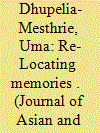

|
|
|
|
|
| Summary/Abstract |
This article plays on the word re-location to examine the memories of Indians in South Africa through oral histories about relocation as a result of the Group Areas Act, to memories of parents and grandparents relocating to South Africa from India as told to interviewers and to their own memories of journeys to India and back. The narratives of mobilities traverse time and national boundaries and are counter-posed by narratives of local mobilities as well as stasis. The article identifies ways of narrating, themes of narration and the meaning of memories while noting the re-location of memory construction against the backdrop of South Africa’s democratic transition and the 150th commemoration of the arrival of indentured Indians to South Africa. It argues that the local and the national are important in narrations of transnational journeys, thus advancing a particular approach to transnational memory studies.
|
|
|
|
|
|
|
|
|
|
|
|
|
|
|
|
| 16 |
ID:
173734


|
|
|
|
|
| Summary/Abstract |
The prevalence of Islamist armed conflicts is an important problem of our time. One pivotal question that remains unexplored is whether conflicts fought over Islamist claims are more or less likely to be negotiated, and if so, why? This paper provides the first large-N study exploring the relationship between Islamist claims and negotiations in all intrastate armed conflicts for the time period 1975–2011. We argue that the transnational dimension can serve to make some Islamist conflicts resistant to peaceful resolution attempts. Our findings show that while conflicts over Islamist claims generally are no more likely to see negotiations, there is significant variation within this category. When we disaggregate Islamist conflicts, we find that transnational Islamist conflicts are less likely to experience negotiations, whereas conflicts fought over separatist or revolutionary Islamist claims are no more likely to see negotiations.
|
|
|
|
|
|
|
|
|
|
|
|
|
|
|
|
| 17 |
ID:
080620
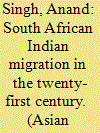

|
|
|
|
|
| Publication |
2008.
|
| Summary/Abstract |
This paper is inspired by three issues, namely ongoing research on South Africans of Indian origin, the anecdotal evidence that accumulates through ongoing discussions on a casual level with such people and the increasing interest among researchers about how globalization and transnational movements are impacting upon identity formation among minorities who are seeking employment or a new life in the developed economies of the 'big five' English-speaking countries, i.e. the USA, Canada, Australia, New Zealand and the UK. It is in countries such as these that a third identity emerges and develops to instill a sense of triple identity. The information here suggests that, when people of Indian origin migrate to one of these countries, they continue to cling to South Africa because it is their country of birth, as well as to India, more for sentimental rather than practical reasons. The topic of this paper reflects a contemporary phenomenon not just among the Indians in South Africa, but also among other diasporas such as Chinese in Latin America, whose new and final emigration destination always seems to be the US. In addition, people of Chinese origin in the countries of Indochina, such as Vietnam, Laos and Cambodia, experienced similar patterns of becoming diasporas in Europe, North America and Oceania in the 1970s. However, migration implores them to renegotiate their identities in order to adapt and settle in accordance with their newly adopted host territories. This gives rise to an identity that straddles three countries, which induces the need to examine new ways of identity building in a global transnational economy.
|
|
|
|
|
|
|
|
|
|
|
|
|
|
|
|
| 18 |
ID:
065969
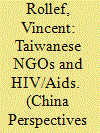

|
|
|
| 19 |
ID:
161898
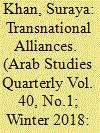

|
|
|
|
|
| Summary/Abstract |
This article examines how the Association of Arab-American University Graduates (AAUG) articulated the Palestine question as both an Arab-American and a Third World issue after the 1967 War. Using archival documents and recollections from several AAUG members, this article traces the ways in which activism on Palestine and other issues facilitated the creation of a transnational Arab-American “intellectual generation.” Although the AAUG often focused on Palestine, it educated its members and engaged in activism on issues affecting other communities who grappled with racism, imperialism, and colonialism. In doing so, it attracted diverse allies to the Palestinian cause, such as Black Americans, Africans, South Asians, and other members of the “global Third World.” This article further analyzes the AAUG's transnational engagement with the Palestinian Liberation Organization (PLO) during its first decade. Using both traditional and academic activism, the AAUG firmly associated Palestine with the Third World and fostered an Arab-American intellectual movement.
|
|
|
|
|
|
|
|
|
|
|
|
|
|
|
|
| 20 |
ID:
145862
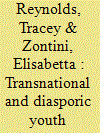

|
|
|
|
|
| Summary/Abstract |
This special issue brings together multidisciplinary and international perspectives on the importance of diasporic and transnational networks for the formation of ethnic identity by migrant youths. Within the context of this issue migrant youths refer to young people (aged 16–35 years) who are themselves migrants or are children and grandchildren of migrants. Our attention to the transnational and diasporic identities of migrant youths is in direct response to policy debates and migration scholarship in this area, which in recent times have focused on the supposed crisis of minority ethnic youths and their perceived marginalisation and social exclusion from a wider society. The special issue broadens the parameters of this debate by exploring not how transnational migrant youths are but more interestingly, we believe, what it means for them to have grown up in a transnational social field. In the special issue rather than simply addressing identity outcomes, we want to emphasise identity processes. This is because we are more interested in understanding the ways the migrant youths are ‘doing transnationalism’ and also through this process ‘doing identity’ (including intersected racial, ethnic, gender, class and sexual identities).
|
|
|
|
|
|
|
|
|
|
|
|
|
|
|
|
|
|
|
|
|